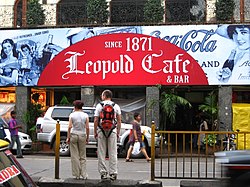| Leopold Cafe | |
|---|---|
 Leopold Cafe pictured in 2007 | |
 | |
| Restaurant information | |
| Established | 1871 |
| Owner(s) | Farzad Jehani, Deenyar Jehani |
| Food type | multi-cuisine |
| Location | Mumbai, Maharashtra, India |
| Coordinates | 18°55′22″N72°49′54″E / 18.9227°N 72.8316°E |
| Other information | Open Daily 7:30am-12am [1] |

The Leopold Cafe and Bar is a restaurant and bar [2] on Colaba Causeway, in Colaba area of Mumbai, India, located across from the Colaba Police station. [3] [4] It was one of the first sites attacked in the 2008 Mumbai attacks. [5]





